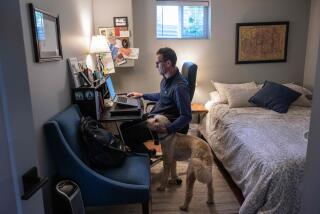How and where to find jobs in the COVID-19 era
How and where you can find jobs is the question of the hour in a nation that’s starting to reopen from coronavirus-induced shutdowns.
May job figures shed a ray of hope, reporting that some 2.5 million people went back to work last month. However, government jobless data also showed that millions remain unemployed and that the economy’s recovery from the damage inflicted by the COVID-19 pandemic will be slow and uneven. Some industries are showing signs of life, while others remain depressed and may remain so for months to come.
Recovering industries may be good places to start to look for work. But if your experience and skills are in a depressed segment of the economy, you may need to retool.
Here’s what experts say about what you should expect in this pandemic-scarred job market and how and where you can find jobs.
Don’t be discouraged
Today’s employment scene bears little resemblance to the job market six months ago, when jobs were plentiful and recruits were in high demand. Though it’s better than in April, there still is roughly one opening for every 10 applicants, according to job-search site Zippia. It is likely to take longer to find a position — particularly, an attractive one.
Many of today’s open positions are poorly paid, according to Zippia’s data.
On the bright side, enhanced unemployment benefits offered through the Pandemic Unemployment Assistance program are available through July. Those benefits provide $600 a week on top of state unemployment benefits to people who are out of work as a result of the pandemic. After that, unemployment benefits are likely to return to normal, far less generous levels.
Time is opportunity
That gives you a month to prepare. Experts suggest you use this time to consider your long-term career goals and gain whatever skills necessary to take your career to the next level.
“We are seeing a lot of people using this collective pause as a time of self-reflection to figure out the work that they’re most passionate about,” says Amy Pocsik, co-founder of Rise Recruiting. “If you aren’t using this time to think about what you want to do long term, you’re missing an opportunity.”
If you’re hoping to switch careers, Pocsik suggests asking former colleagues what they think you’re best at — the talents they’d put on your job recommendation — to find your core strengths. Are those strengths transferrable and valued in your targeted field? If not, what skills should you develop to be an attractive candidate?
If you simply hope to jump to a higher level in your existing career, take a look at the requirements for that next-level position. Then find a free or low-cost training program through a community college or online classes.
“I’m sure we’ve all looked at job listings and realized the skills that we don’t have and need,” says Kathy Morris, head of content at Zippia. “This is a really good time to take a course, get a certificate, and jump-start your career.”
Pockets of hiring
Where are the best hiring prospects now? Telecommunications, energy and insurance, according to Zippia. All three of these fields have a relatively large number of openings compared with potential recruits. Healthcare firms, finance companies and nonprofits are also looking for a fair number of workers compared with the numbers of applicants they’re receiving, Zippia’s data say.
Restaurants, hotels and retailers are also hiring a lot of workers as communities open up. But the number of people seeking work in these hard-hit industries remains overwhelming compared with the number of jobs available.
Anticipated second-wave opportunities
The market for teachers currently appears depressed, too, Morris says. But those figures may be misleading. Public schools are understandably uncertain about what may happen next fall. Many stopped hiring when schools closed. But summer vacation season allows schools time to watch the course of the pandemic. They may simply wait to address their staffing needs closer to the end of the summer.
Meanwhile, online teachers and tutors are already in high demand. And COVID-19 could move the job market for teachers from public schools to private schools with smaller class sizes.
“It’s hard to say how comfortable people are going to feel with sending their kids to school in the fall,” Morris says. “For private companies, that may be an opportunity.”
Freelancers in demand
Whether the current recession, fueled by unprecedented government-mandated shutdowns, will follow the pattern of other recessions is hard to handicap. But if it does, freelancers are also likely to find plenty of work in coming months, Morris says.
“During the Great Recession [of 2007-2009], a lot of companies didn’t hire full-time employees. They hired freelancers,” she says. “When you don’t know what the future holds, freelancers are really attractive — even when you have to pay more per hour.”
Why? Hiring is expensive. A traditional hiring process, which involves background checks and training, often costs tens of thousands of dollars. Furloughing and laying off employees, which typically requires notice and severance, can be equally costly.
Not surprisingly, companies are reluctant to make that economic commitment, until they are fairly certain they’ll need that new hire for years to come. Thus, in the tentative early stages of a recovery, many companies lean on freelancers to handle increased workloads.
A number of trade groups and online platforms connect freelancers in professional fields, such as accounting, insurance, technology, marketing and communications. Other platforms, such as Upwork, Remote and FlexJobs, connect workers with freelance opportunities in a wider array of fields. You can also search freelance opportunities by industry group on SideHusl.com’s work page.
New skills needed
However, companies in virtually every industry are likely to require new hires to have remote-working skills to cope with the possibility of a second COVID-19 shutdown. The key skills in this category include:
Teleconferencing: If you haven’t yet participated in a Zoom or Skype meeting, call a friend and set one up, Pocsik says. These popular teleconferencing platforms allow multiple people to participate in video calls. They’ve been invaluable during the pandemic and are likely to remain popular for corporate interviews and staff meetings. Practice using them, she suggests.
Active listening: When working at home, it’s easy to be distracted by kids, pets, cellphones and household tasks. That makes it all the more important that you use active listening techniques when involved in work calls. What does that mean? Eliminate all other distractions, including your cellphone, so you can pay full attention. Take notes. And restate the main points of what you heard at the end of the conversation to make sure you heard accurately.
Communication and follow-up: When a workforce is scattered, it’s easy to lose track of who is doing what and when it’s due. Communicate regularly with your co-workers. After project meetings, it’s also wise to write a follow-up email that reiterates what the meeting was about; establishes who has agreed to do what; and the timetable. This helps ensure that your team has the same understanding and expectations.
Research and networking
When looking for positions in a tight job market, it’s more important than ever to use your connections to get an edge, Pocsik says. These connections can not only provide a job recommendation, but also fill you in on the corporate culture. That can help you understand how to position yourself to better fit the job opening.
Comb LinkedIn for connections in the industry that you’re hoping to break into, she suggests. If there’s a particular company that you want to work for, see if you — or if anyone you know — knows someone who works there.
If your network feels thin, perhaps because you’re a new graduate without a lot of professional contacts, don’t be shy about contacting former teachers. Instructors often have rich networks.
Schools, alumni associations and industry networking groups are also important, says Pocsik, who is also co-founder of the Women’s Business League. Spend some time researching what groups might help you meet people in your chosen field.
Kristof is the editor of SideHusl.com, an independent site that reviews hundreds of money-making opportunities in the gig economy.
More to Read
Inside the business of entertainment
The Wide Shot brings you news, analysis and insights on everything from streaming wars to production — and what it all means for the future.
You may occasionally receive promotional content from the Los Angeles Times.










